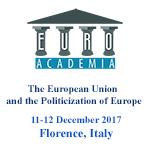Euroacademia Conferences
 Europe Inside-Out: Europe and Europeanness Exposed to Plural Observers (9th Edition) April 24 - 25, 2020
Europe Inside-Out: Europe and Europeanness Exposed to Plural Observers (9th Edition) April 24 - 25, 2020 Identities and Identifications: Politicized Uses of Collective Identities (9th Edition) June 12 - 13, 2020
Identities and Identifications: Politicized Uses of Collective Identities (9th Edition) June 12 - 13, 2020 8th Forum of Critical Studies: Asking Big Questions Again January 24 - 25, 2020
8th Forum of Critical Studies: Asking Big Questions Again January 24 - 25, 2020 Re-Inventing Eastern Europe (7th Edition) December 13 - 14, 2019
Re-Inventing Eastern Europe (7th Edition) December 13 - 14, 2019 The European Union and the Politicization of Europe (8th Edition) October 25 - 26, 2019
The European Union and the Politicization of Europe (8th Edition) October 25 - 26, 2019 Identities and Identifications: Politicized Uses of Collective Identities (8th Edition) June 28 - 29, 2019
Identities and Identifications: Politicized Uses of Collective Identities (8th Edition) June 28 - 29, 2019 The European Union and the Politicization of Europe (7th Edition) January 25 - 26, 2019
The European Union and the Politicization of Europe (7th Edition) January 25 - 26, 2019 7th Forum of Critical Studies: Asking Big Questions Again November 23 - 24, 2018
7th Forum of Critical Studies: Asking Big Questions Again November 23 - 24, 2018 Europe Inside-Out: Europe and Europeanness Exposed to Plural Observers (8th Edition) September 28 - 30, 2018
Europe Inside-Out: Europe and Europeanness Exposed to Plural Observers (8th Edition) September 28 - 30, 2018 Identities and Identifications: Politicized Uses of Collective Identities (7th Edition) June 14 - 15, 2018
Identities and Identifications: Politicized Uses of Collective Identities (7th Edition) June 14 - 15, 2018
Euroscepticism in the Turkish Press
-
-

-
Presentation speakers
- Alaaddin F. Paksoy, Anadolu University, Eskişehir, Turkey
Abstract:
Not long ago, Turkish dailies’ front pages were decorated by EU flags and the pre-celebrations of the accession were making the headlines. Questionnaires results showing the view of Turkish people about the EU, Turkish and EU leaders’ positive comments about Turkey’s EU bid, and the motivation to meet the Copenhagen criteria were the main topics that the Turkish press covers on those days. Likewise, Turkey was the main topic in Brussels. Things drastically changed in 2006 and 2007. Since then, the Turkish case again became a huge question mark over the European map. The stance of Turkish press is an interesting point to follow this transformation. The Turkish press has never been a Europhile environment except the halcyon days between 1999 and 2006, ie. period between the announcement of Turkey’s official candidacy and the start of membership negotiations. Since 2006, there are loud and clear examples of negative views towards the EU in the coverage. However, in recent years there is a strong degree of Euroscepticism that is building the overall discourse about the EU itself and Turkey’s relations with the union. This paper is interested in this transformation in the Turkish press and focusing on these 2 main questions:
-How are the EU and its relations with Turkey, and the EU’s social actors, events and processes referred to?
-What labels and characteristics are employed to define the EU and its relations with Turkey?
The study looks at 5 national Turkish dailies by gathering the news reports from the PRNet online database. Both opposition and pro-government papers will be included. The data will be analysed by employing Critical Discourse Analysis, drawing on Discourse-Historical Approach (Wodak & Boukala, 2015). Findings are analysed within the context of the history of Turkey-EU relations, Turkey’s own internal and regional issues in recent years, and the ongoing political clashes inside the EU. -
Related Presentations

What is the ‘Wright’ Modernism of the Mid-Century Cold War? American Design in Mid-Century Cold War Propaganda
- Heather Elisabeth













